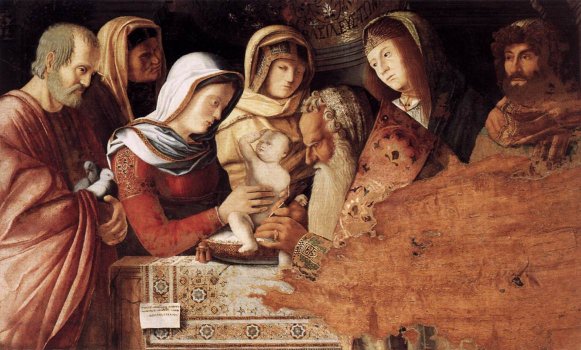|
These three traditional Jewish rituals took place in
the days following the birth of Jesus. Our problem is that they are often
confused in art, with elements from one ceremony turning up in images of
another.
Let’s start with Luke’s account. (Chapter 2). According to Giza Vermes
(The Nativity) he doesn’t get it quite right either.
And when eight days were accomplished for the circumcising of the
child, his name was called JESUS, which was so named of the angel before
he was conceived in the womb.
And when the days of
her purification according to the law of Moses were accomplished, they
brought him to Jerusalem, to present him to the Lord; (As it is written in
the law of the Lord, Every male that openeth the womb shall be called holy
to the Lord;) And to offer a sacrifice according to that which is said in
the law of the Lord, A pair of turtledoves, or two young pigeons. And,
behold, there was a man in Jerusalem, whose name was Simeon; and the same
man was just and devout, waiting for the consolation of Israel: and the
Holy Ghost was upon him. And it was revealed unto him by the Holy Ghost,
that he should not see death, before he had seen the Lord's Christ. And he
came by the Spirit into the temple: and when the parents brought in the
child Jesus, to do for him after the custom of the law, Then took he him
up in his arms, and blessed God, and said, Lord, now lettest thou thy
servant depart in peace, according to thy word: For mine eyes have seen
thy salvation, Which thou hast prepared before the face of all people; A
light to lighten the Gentiles, and the glory of thy people Israel. And
Joseph and his mother marvelled at those things which were spoken of him.
And Simeon blessed them, and said unto Mary his mother, Behold, this child
is set for the fall and rising again of many in Israel; and for a sign
which shall be spoken against; (Yea, a sword shall pierce through thy own
soul also,) that the thoughts of many hearts may be revealed. And there
was one Anna, a prophetess, the daughter of Phanuel, of the tribe of Aser:
she was of a great age, and had lived with an husband seven years from her
virginity; And she was a widow of about fourscore and four years, which
departed not from the temple, but served God with fastings and prayers
night and day. And she coming in that instant gave thanks likewise unto
the Lord, and spake of him to all them that looked for redemption in
Jerusalem. And when they had performed all things according to the law of
the Lord, they returned into Galilee, to their own city Nazareth.
So, the Key facts:
Circumcision. This took place eight days
after the birth of Christ, and is celebrated on January 1st.
Luke’s brief account tells us that it was the day on which the child was
given the name Jesus.
The presentation of Christ in the temple, and the
purification of the Virgin. These are separate ceremonies,
but are celebrated on the same day – forty days after the birth of
Christ, February 2nd, sometimes known as Candlemas.
Luke’s account does rather confuse the issue, so let’s try and
separate them.
The
purification ceremony was for women who had given birth to a male
child. A sacrifice was necessary; a year-old lamb and a turtledove. For
poor families, two doves would be acceptable. This is all made clear in
Leviticus:
A woman who becomes pregnant and gives birth to a son will be
ceremonially unclean for seven days, just as she is unclean during her
monthly period. On the eighth day the boy is to be circumcised. Then the
woman must wait thirty-three days to be purified from her bleeding. She
must not touch anything sacred or go to the sanctuary until the days of
her purification are over. When the days of her purification for a son
or daughter are over, she is to bring to the priest at the entrance to the
Tent of Meeting a year-old lamb for a burnt offering and a young pigeon or
a dove for a sin offering.
If she cannot afford a lamb, she is to bring two
doves or two young pigeons, one for a burnt offering and the other for a
sin offering. In this way the priest will make atonement for her, and she
will be clean. (Leviticus 12:2-6, 8)
A key point is that the purification ceremony should take
place outside the temple, unlike the Presentation. Centuries
later, the Christian ceremony of 'Churching of Women' often took place at
the church door.
Note:
More recent versions of Luke 2 22 have ‘When the days of their
purification’ which doesn’t fit with Leviticus and provides much
useful material for theologians to argue over. Which is the better match
to the original Greek, I have no idea.
The Presentation: According to Jewish
tradition, firstborn male children ‘belonged’ to God, and their lives
should be dedicated to the service of the Temple:
Sanctify unto me all the firstborn, whatsoever openeth the womb among
the children of Israel, both of man and of beast: it is mine. (Exodus
13:1)
This demand is repeated in Numbers 3:11-13. However, firstborns
could be redeemed by payment of five shekels. Presumably this could take
place in the Temple (but after the purification, if the mother was to be
present.)
In Luke’s gospel the
characters of Simeon and Anna are introduced, and they regularly appear in
art. They have, however, nothing to do with the Purification of the Virgin
or the circumcision. Many paintings – and indeed the gospel of Luke –
confusingly conflate these events.
A Case in point: The Circumcision by Marco Marziale.
|
